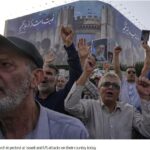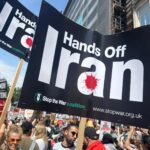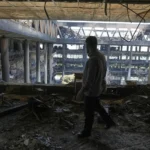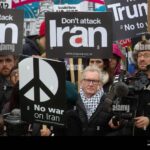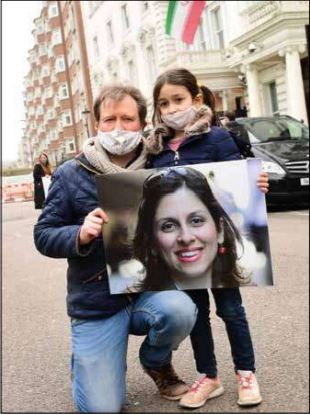
On the occasion of United Nations Human Rights Day (10th December) the human rights situation in the Islamic Republic of Iran continues to be a desperate one for anyone opposed to the regime. Jane Green reports.
Human rights abuse in Iran continues to be an issue for young people, women, trade unionists, ethnic and religious minorities, and the political opposition. The regime does not see the judiciary as being independent from the ruling theocracy in the country. The Islamic Republic’s judicial system criminalises dissent and even imprisons lawyers for doing their job. Few lawyers will continue to take on human rights cases due to the level of intimidation by the regime and its security services.
Anyone remotely critical of the regime is usually tried under trumped-up “national security” charges. Cases often involve individuals who have been targeted by the state’s sprawling security establishment for publicly criticising the government and it is the state security agencies, not the rule of law, that dictates the outcome of the cases.
In effect, in the Islamic Republic, those detained under trumped-up national security charges are guilty until proven innocent. Intelligence agents carry out the arrests and fabricate the charges. The judicial process becomes a means to settle political scores.
The targeting of lawyers in order to weaken the chances of effective legal representation is underlined by the fact that, as of November 2021, at least five defence lawyers had confirmed prison sentences based on false charges. Of these, Mohammad Najafi and Soheila Hejab are still in prison. Nasrin Sotoudeh is temporarily out of prison on sick leave. Giti Pourfazel and Payam Derafshan are currently on parole.
Another three human rights lawyers, Arash Keykhosravi, Mostafa Nili, and Mohammad Reza Faghihi , are awaiting trial on trumped-up charges because they tried to sue the government for its failed COVID-19 response. Of the three, only Mohammad Reza Faghihi is out of jail on bail, the other two are still in detention.
The case of Iranian-British dual national, Nazanin Zaghari-Ratcliffe, debated in the House of Lords on 2 December, is a further example of the Iranian government’s use of imprisonment for political purposes. Ms. Zaghari-Ratcliffe is effectively being held hostage as part of negotiations for money owed to Iran by the British government for a weapons deal in the 1970s.
A recent report from Amnesty International has highlighted the ongoing issue of the unlawful killing of at least 324 members of the public in mass protests which swept Iran in November 2019. There is no evidence that those engaged in the protests possessed firearms or posed any threat to life, yet the security forces still engaged in the unwarranted use of lethal force.
Two years on from the protests, the families of victims continue their campaign for truth and justice in the face of ongoing harassment and intimidation from the authorities. The regime has undertaken a ruthless campaign to intimidate families and prevent them from speaking out. The regime persists in its refusal to reveal the truth about the death toll; conduct thorough, independent and impartial criminal investigations; and bring to justice those responsible for ordering and carrying out these killings.
Given the gravity of the human rights violations in Iran, Amnesty International has reiterated its call to member states of the UN Human Rights Council to mandate an inquiry into the killings, and identify pathways for truth, justice and reparations.
State violence against those defending their rights is not something which is confined to the 2019 protests in Iran. In November of this year the security forces attacked, injured, and arrested a large number of farmers who were camping on the dried-out riverbed of the Zayandeh Rud, in Isfahan, to protest against the regime’s disastrous water management policies.
The security forces set fire to the farmers’ tents. The attack upon the protestors continued into Thursday and Friday (25 November and 26 November respectively) and was met with widespread resistance, marked by fierce clashes between the people and the regime’s thugs. Mass protests against the lack of water, which Isfahan’s farmers had originally begun two weeks earlier, were welcomed and further swelled by thousands of Isfahan residents, before spreading to Shahr-e Kord, the capital of neighbouring Chaharmahal and Bakhtiari province, as well as other suburban towns in Isfahan province.
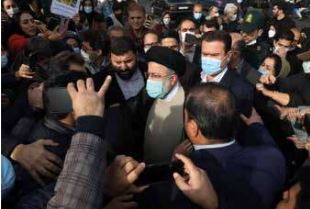
According to the latest reports, at least 214 people, including 13 children, were arrested following the arrival of police and security forces which saw the beating and shooting of protestors. At least 19 of those injured in the protests have been hospitalised. Official sources have reported the condition of two of them to be critical.
The assault on human rights also extends into the cultural sector with Baktash Abtin a poet, documentary filmmaker and a member of the Iranian Writers’ Association, being imprisoned on charges of “gathering and colluding with the intention of committing acts against national security” and “propaganda against the state. Abtin, along with two other members of the Iranian Writers’ Association’s board of directors, Reza Khandan Mahabadi and Keyvan Bajan, were sentenced to 6 years each in prison.
The evidence to support the accusations were the books published by the Iranian Writers’ Association, including the commemorative work “Fifty Years of the Writers’ Association of Iran,” statements by the Writers’ Association and articles and content published on Abtin’s personal social media accounts.
The rise of labour strikes, including in the automobile maker Iran Khodro, mines, and manufacturing industries, along with popular protests across the country, reflects the deepening crisis in Iran. The regime is increasingly seen by the vast majority of the people in Iran as a major barrier to progress and the establishment of freedom, democracy, and social justice.
The experience of recent years in Iran is that the macro-economic policies of the Islamic regime have resulted in the destruction of the infrastructure of manufacturing and driven millions of people below the poverty line and into deprivation. This situation is further exacerbated by widespread corruption within the regime, which sees millions of dollars syphoned out of the economy into private hands.
The necessity of expressing solidarity and continuing to publicly challenge and defy the government, is increasingly seen by many as the only means to move away from a regime whose continuation is synonymous with that of disaster, poverty, deprivation, and misery in the country.
In the UK major trade unions unions have added their voices to expressions of support for the Iranian people and in condemnation of the human rights record of the Iranian government. It is vital that such support continues to build and extends across the labour and peace movement.
Such solidarity, especially articulated on UN Human Rights Day, will send a clear message to the Iranian people that they continue to have international support in their struggle for peace, human rights and democracy.

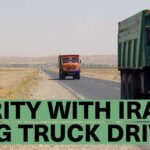


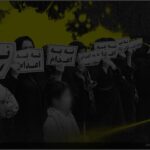


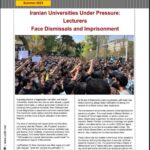
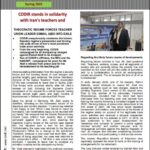




 Posted in
Posted in 
